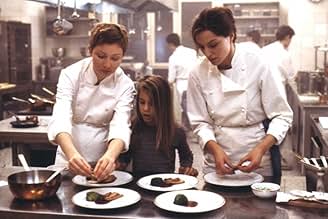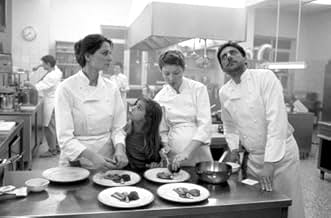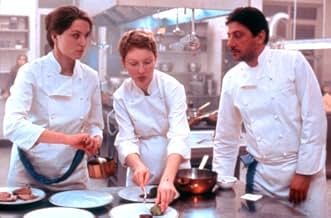IMDb RATING
7.2/10
8.8K
YOUR RATING
When a headstrong chef takes charge of her equally stubborn 8-year-old niece, the tensions between them mount... until an Italian sous-chef arrives to lighten the mood.When a headstrong chef takes charge of her equally stubborn 8-year-old niece, the tensions between them mount... until an Italian sous-chef arrives to lighten the mood.When a headstrong chef takes charge of her equally stubborn 8-year-old niece, the tensions between them mount... until an Italian sous-chef arrives to lighten the mood.
- Awards
- 14 wins & 7 nominations total
Wolf-Dietrich Sprenger
- Lauter Gast
- (as W.D. Sprenger)
Victoria Trauttmansdorff
- Begleiterin
- (as Victoria von Trautmannsdorf)
Jerome Ducornau
- Jean
- (as Jerome Ducournau)
- Director
- Writer
- All cast & crew
- Production, box office & more at IMDbPro
Featured reviews
The charms outweigh the clichés in "Mostly Martha (Bella Martha)." Of course it's right away different in that the phrase "German romantic comedy" isn't common and can be applied here.
I loved that "Martha" herself is a competent, self-possessed professional and that's what attracts the guy to her. While we first meet her in therapy, her problems are those of work and personal life I could certainly relate to.
While this will remind others of food prep movies like "Wedding Banquet," "Eat, Drink, Man, Woman," and "Tortilla Soup" or restaurant movies like "Dinner Rush" and "Big Night," (which all had male chefs), or "Babette's Feast," I have zero interest in cooking so cared only that "Martha" is very good at her job and at managing the restaurant kitchen.
The restaurant characters seem like real co-workers, and amazingly the niece is not some adorable child actor but seems like a real kid whose surliness is legit.
The Italian sous chef who comes on board brings the sensuality of the Mediterranean --in music (with a generous use of Paolo Conte songs), movement and language much like in the Danish "Italian for Beginners."
And of course in romance, which is still delightful even as the clichés start appearing, her happiness is indicated by her loosened hair like Jane Fonda's in "Electric Horseman."
But I enjoyed the build-up to their relationship in ever longer, longing glances and their mutual professional respect and concluding compromises.
(originally written 9/2/2002)
I loved that "Martha" herself is a competent, self-possessed professional and that's what attracts the guy to her. While we first meet her in therapy, her problems are those of work and personal life I could certainly relate to.
While this will remind others of food prep movies like "Wedding Banquet," "Eat, Drink, Man, Woman," and "Tortilla Soup" or restaurant movies like "Dinner Rush" and "Big Night," (which all had male chefs), or "Babette's Feast," I have zero interest in cooking so cared only that "Martha" is very good at her job and at managing the restaurant kitchen.
The restaurant characters seem like real co-workers, and amazingly the niece is not some adorable child actor but seems like a real kid whose surliness is legit.
The Italian sous chef who comes on board brings the sensuality of the Mediterranean --in music (with a generous use of Paolo Conte songs), movement and language much like in the Danish "Italian for Beginners."
And of course in romance, which is still delightful even as the clichés start appearing, her happiness is indicated by her loosened hair like Jane Fonda's in "Electric Horseman."
But I enjoyed the build-up to their relationship in ever longer, longing glances and their mutual professional respect and concluding compromises.
(originally written 9/2/2002)
A few rhetorical questions:
a. Why are there no great English-language food/romance movies? Whenever you see a movie that truly ravishes you with food preparation and recipes as part of the atmosphere of the movie, it comes from France or Mexico or Hong Kong - or, if it is in English, it's borrowed culturally from another country (e.g. Chocolat, or the Mexican-American adaptation of Ang Lee's Eat Drink Man Woman). I think it's because the English speaking societies of the world have a relatively unsophisticated approach to food preparation and dining, manifest in our great contributions to world culinary arts - fast food and industrial agriculture, plus cooking technologies that take art out of the equation. You can't have a sexy drama set amidst a world of force-fed veal or microwave dinners.
b. Why do we never talk about German comedy? The Germans do have a comedic tradition, but the movies that are released in the US tend to be solemn dramas, violent or shocking action pieces or grim experimental works. On the rare instances that I see a German comedy, I'm always pleasantly surprised, and I have the feeling I'm missing out.
c. Why are European movies so much better than American films at showing sexiness and desirability in 30- or 40-something year-old women? I have a pet theory, that European sensibilities about marriage and commitment are sufficiently different from American norms that there is the expectation that a 35-year old woman may yet be actively and happily single, or perhaps a single mom who isn't stigmatized to feel that she had best find some sucker to marry her and get out of the dating pool.
d. Why isn't jazz used in American soundtracks anymore? In this film set in Germany, the score is assembled by Manfred Eicher (founder of ECM, the acclaimed modern-jazz label), and it's all good. Some nice German lieder, classic vocal jazz, and instrumental pieces by Keith Jarrett and others. We Americans appear to have forgotten jazz as soundtrack music.
In any case, Mostly Martha is a fine little movie set in contemporary Köln, starring Martina Gedeck as the title character. Martha is a neurotic, workaholic chef at a high-end restaurant, whose control freak tendencies keep her at a distance from everyone. When her boss insists that she go to therapy, she replies by preparing recipes for the hapless shrink. Both lonely and a loner (a tricky combination), she throws herself into her work to the point of exhaustion.
Martha's single-minded life is thrown upside down when she suddenly becomes the guardian to her niece Lina (Maxime Foerste). As she struggles to take on this new role, the arrival of a competitor in the form of a brash Italian chef (Sergio Castellitto) threatens her supremacy in the kitchen.
Any viewer of romantic comedies knows where this is going, but I have no complaints about the plot line. The performances were all good; the dialogue is thoughtful; the food looks delicious. It's not a great movie, but it's a good one and would be an admirable effort by any studio.
a. Why are there no great English-language food/romance movies? Whenever you see a movie that truly ravishes you with food preparation and recipes as part of the atmosphere of the movie, it comes from France or Mexico or Hong Kong - or, if it is in English, it's borrowed culturally from another country (e.g. Chocolat, or the Mexican-American adaptation of Ang Lee's Eat Drink Man Woman). I think it's because the English speaking societies of the world have a relatively unsophisticated approach to food preparation and dining, manifest in our great contributions to world culinary arts - fast food and industrial agriculture, plus cooking technologies that take art out of the equation. You can't have a sexy drama set amidst a world of force-fed veal or microwave dinners.
b. Why do we never talk about German comedy? The Germans do have a comedic tradition, but the movies that are released in the US tend to be solemn dramas, violent or shocking action pieces or grim experimental works. On the rare instances that I see a German comedy, I'm always pleasantly surprised, and I have the feeling I'm missing out.
c. Why are European movies so much better than American films at showing sexiness and desirability in 30- or 40-something year-old women? I have a pet theory, that European sensibilities about marriage and commitment are sufficiently different from American norms that there is the expectation that a 35-year old woman may yet be actively and happily single, or perhaps a single mom who isn't stigmatized to feel that she had best find some sucker to marry her and get out of the dating pool.
d. Why isn't jazz used in American soundtracks anymore? In this film set in Germany, the score is assembled by Manfred Eicher (founder of ECM, the acclaimed modern-jazz label), and it's all good. Some nice German lieder, classic vocal jazz, and instrumental pieces by Keith Jarrett and others. We Americans appear to have forgotten jazz as soundtrack music.
In any case, Mostly Martha is a fine little movie set in contemporary Köln, starring Martina Gedeck as the title character. Martha is a neurotic, workaholic chef at a high-end restaurant, whose control freak tendencies keep her at a distance from everyone. When her boss insists that she go to therapy, she replies by preparing recipes for the hapless shrink. Both lonely and a loner (a tricky combination), she throws herself into her work to the point of exhaustion.
Martha's single-minded life is thrown upside down when she suddenly becomes the guardian to her niece Lina (Maxime Foerste). As she struggles to take on this new role, the arrival of a competitor in the form of a brash Italian chef (Sergio Castellitto) threatens her supremacy in the kitchen.
Any viewer of romantic comedies knows where this is going, but I have no complaints about the plot line. The performances were all good; the dialogue is thoughtful; the food looks delicious. It's not a great movie, but it's a good one and would be an admirable effort by any studio.
This film is an excellent psychological study of a VERY controlled and emotionally constricted woman who uses food, believe it or not, as a way of avoiding intimacy. She is a superb chef who is incredibly precise and demanding concerning her cooking because she is so uncomfortable with people. However, into her tightly controlled world comes chaos in the form of her niece--whose mother was just killed in an auto accident. Not surprisingly, she has a hard time relating to this child and I was thrilled that her transformation to a whole person took time and wasn't achieved in a Hollywood-style way. Instead, this little girl (who was not overly cute or fake--thank goodness) and a new chef at her restaurant (who was completely unlike her) influence Martha in a way that is believable and satisfying.
By the way, while not quite as good as The Big Night (which came out the same year) or Babette's feast, this movie is VERY reminiscent of them--elevating food to a true work of art.
By the way, while not quite as good as The Big Night (which came out the same year) or Babette's feast, this movie is VERY reminiscent of them--elevating food to a true work of art.
This German film is one of the happiest surprises of the year. Not only is it a well paced, acted, and directed, but it involves the viewer like no other film in recent memory. Director/writer Sandra Nettelbeck deserves praise for bringing this joyous piece to the screen.
Martina Gedleck, as Martha, is perfect as the control freak of the upscale restaurant. Obviously, she can cook, judging by the full houses and the good vibes she generates among the diners. What she has in smarts, she lacks in social graces. Obviously, she doesn't have a life.
Her world is shattered by the arrival of a niece that comes to her under tragic circumstances, and from Mario, the new Italian cook. One can see the new man in her kitchen is too much of a free spirit, who ultimately will be her downfall.
Mario, very nicely played by Sergio Castelletto, is the opposite of his German colleague. It doesn't take long for him to charm the daylights out of Martha. Sparks fly whenever they are on screen together. Both principals have the right chemistry and that's why this film works so well. It will surely disarm anyone in the right state of mind. The only thing is that one must leave the theatre craving for a great meal.
Martina Gedleck, as Martha, is perfect as the control freak of the upscale restaurant. Obviously, she can cook, judging by the full houses and the good vibes she generates among the diners. What she has in smarts, she lacks in social graces. Obviously, she doesn't have a life.
Her world is shattered by the arrival of a niece that comes to her under tragic circumstances, and from Mario, the new Italian cook. One can see the new man in her kitchen is too much of a free spirit, who ultimately will be her downfall.
Mario, very nicely played by Sergio Castelletto, is the opposite of his German colleague. It doesn't take long for him to charm the daylights out of Martha. Sparks fly whenever they are on screen together. Both principals have the right chemistry and that's why this film works so well. It will surely disarm anyone in the right state of mind. The only thing is that one must leave the theatre craving for a great meal.
It's almost as if Nettelbeck had been given a recipe for a perfect film - start with the tried-and-tested, take a character living alone, set in his/her ways then saddle him/her with a young kid and simmer the love-hate on a low flame; add a culture clash and vamp til ready -and discarded it in favor of her own ingredients. The culinery metaphor is self-explanatory but it IS fun to see the heavy, lard-based German cuisine slugging it out with the lighter, oil-based Italian style. Up front we have two cold teutonic hearts, aunt and neice and with the introduction of the Italian extrovert chef we know it is only a matter of time til the warm Italian sun thaws the cold aryan hearts. That's pretty much what happens but it is a DELIGHT to go along for the ride and surrender your emotional taste-buds to Nettelbeck's expertise for the entire running time. I've just seen this movie for the second time in about 8 months and I was just as captivated this time around. 9/10
Did you know
- TriviaSergio Castellitto's German wasn't good enough so Frank Glaubrecht was brought in to dub his voice for the German version.
- GoofsWhen Mario and Lina get ready to cook dinner at Martha's apartment, Lina puts on her apron twice.
- ConnectionsFeatured in Le cinéma passe à table (2005)
- SoundtracksCountry
Written by Keith Jarrett
Performed by Keith Jarrett, Jan Garbarek, Palle Danielsson, Jørn Christensen
ECM Records
- How long is Mostly Martha?Powered by Alexa
Details
Box office
- Gross US & Canada
- $4,160,475
- Opening weekend US & Canada
- $40,446
- Aug 18, 2002
- Gross worldwide
- $9,852,022
- Runtime1 hour 49 minutes
- Color
- Sound mix
- Aspect ratio
- 1.85 : 1
Contribute to this page
Suggest an edit or add missing content

![Watch Trailer [OV]](https://m.media-amazon.com/images/M/MV5BYmI4MTFiNjAtNzg5ZC00Mjg2LWFhNDYtMTVhYjYyMTM3ZGM5XkEyXkFqcGdeQXRyYW5zY29kZS13b3JrZmxvdw@@._V1_QL75_UX500_CR0)



























